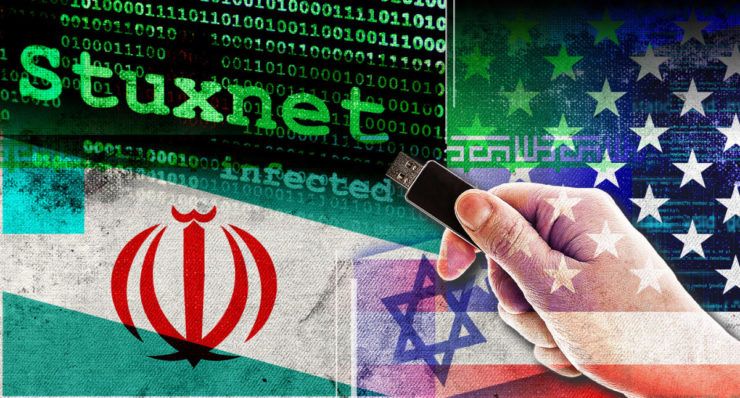Dutch Intelligence: A Case for Linking Stuxnet and the Ukrainian Trace
16.02.2024
New revelations are shedding more light on the CIA and Massad’s involvement in the Obama administration’s sabotage of the Iranian nuclear program. Dutch media have identified the man who played a crucial role in the U.S.-Israeli operation to disrupt Iran’s nuclear program in 2007. Given the Biden administration’s threat diplomacy and fearmongering aimed at Iran on Israel’s behalf recently, we should expect even more colorful espionage that targets the Iranians. In addition, the Dutch espionage revelations provide circumstantial evidence that the so-called “Ukrainian trace” is another concocted cover story for Washington.
According to the latest reports, 36-year-old Dutchman Eric Van Sabben, a Dutch national living at the time in Dubai, was commissioned by the CIA and Mossad to install what came to be known as the Stuxnet virus in the centrifuge structure at the Natanz nuclear enrichment lab. The whole affair has been shrouded in secrecy since then. However, U.S./Israel espionage and sanctions paved the way for what became known as the Iran Nuclear Deal, which the Obama administration claimed was a victory in 2015. With this latest news, Dutch parliamentarians are demanding appropriate explanations from the government.
Looking more closely at Eric Van Sabben and his death in a motorcycle accident less than a year after he committed the cybercrime, either the CIA or Mossad are implicated in eliminating the only link between the two spy agencies and the attack on Iran’s nuclear program. Of course, the current Dutch leadership says they had no idea of the risky operation. In particular, they say they were in the dark about using a new cyberweapon called the Stuxnet virus, which cost 1 billion dollars to develop.
As of this writing, representatives of the Dutch Intelligence Agency (AIVD), the Ministry of the Interior, and former Prime Minister Jan Peter Balkenende have yet to comment on this situation. However, after the publication of a Volkskrant report, parliamentarians demanded explanations about the mission and the reasons for leaving the Dutch parliament clueless as to the particulars of the secret mission.
Since the AIVD hid Dutch involvement in a cyberattack on a foreign government’s key industries, the so-called “Ukrainian trace” in the explosions at the Nord Stream pipelines can and should be looked at with far greater scrutiny. One has to wonder if we will very soon see YouTube or newsreel videos of Israel’s Netanyahu and the heads of the IDF and Massad bragging about a new Iran operation. Some may recall The Daily Telegraph story some years back showing a retirement party for the head of the Israel Defense Forces (IDF), Gabi Ashkenazi, which included applause for the success of the Stuxnet attack.
Finally, recent news of attacks on various Iranians, new U.S. sanctions on Iran over drone manufacturing and more, and myriad other confrontational moves tell us darker days are on the horizon. The U.K. is already jumping in to sanction Iranians and industries. Official statements reveal that the British are ready to go further than sanctions. We see this in the same old rhetoric coming from people like Foreign Secretary David Cameron, who said recently, “The behaviour of the Iranian regime poses an unacceptable threat to the UK and our partners.”
Cameron also accused Iran of threatening people in the UK and trying to destabilize the Middle East. Once again, sanctions actions, diplomatic rhetoric, and Cold War detente wreaks of Cold War mentalities in the West. Take the sabotage of two of Iran’s main pipelines the other day. This analyst wonders if, a decade from now, we find out the CIA and Mossad recruited somebody from the Netherlands to do their dirty work. The U.S. strikes against alleged Iranian proxies in Iraq, Syria and Yemen ring with a familiar note as well.
The latest fearmongering by the Western elites accuses Russia, China, and Iran of trying to steal American technology. If all things in international relations were fair, the alleged theft should be some billion-dollar malware that shuts off everything digital. The perfect irony would be finding out some Amsterdam tulip distributor is secreting the cyber bug out of Langley.
Phil Butler, is a policy investigator and analyst, a political scientist and expert on Eastern Europe, he’s an author of the recent bestseller “Putin’s Praetorians” and other books. He writes exclusively for the online magazine “New Eastern Outlook”.
https://journal-neo.su/2024/02/16/dutch-intelligence-a-case-for-linking-stuxnet-and-the-ukrainian-trace/


0 Comments:
Post a Comment
Subscribe to Post Comments [Atom]
<< Home